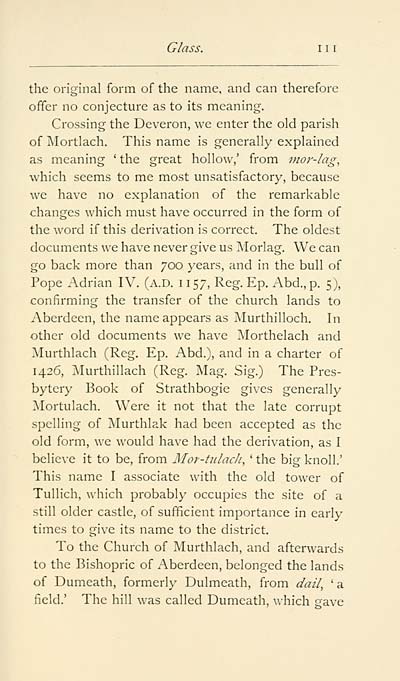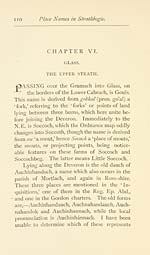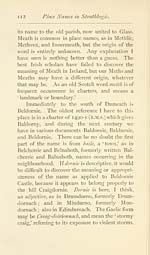Blair Collection > Place names in Strathbogie, with notes historical, antiquarian and descriptive
(135)
Download files
Complete book:
Individual page:
Thumbnail gallery: Grid view | List view

Glass. 1 1 1
the original form of the name, and can therefore
offer no conjecture as to its meaning.
Crossing the Deveron, we enter the old parish
of jMortlach. This name is generally explained
as meaning ' the great hollow,' from inor-Iag,
which seems to me most unsatisfactory, because
we have no explanation of the remarkable
changes which must have occurred in the form of
the word if this derivation is correct. The oldest
documents we have never give us Morlag. We can
go back more than 700 years, and in the bull of
Pope Adrian IV. (A.D. 11 57, Reg. Ep. Abd., p. 5),
confirming the transfer of the church lands to
Aberdeen, the name appears as Murthilloch. In
other old documents we have Morthelach and
Murthlach (Reg. Ep. Abd.), and in a charter of
1426, Murthillach (Reg. Mag. Sig.) The Pres-
bytery Book of Strathbogie gives generally
Mortulach. Were it not that the late corrupt
spelling of Murthlak had been accepted as the
old form, we would have had the derivation, as I
believe it to be, from Mor-tulacJi, ' the big knoll.'
This name I associate with the old tower of
Tullich, which probably occupies the site of a
still older castle, of sufficient importance in early
times to give its name to the district.
To the Church of Murthlach, and afterwards
to the Bishopric of Aberdeen, belonged the lands
of Dumeath, formerly Dulmeath, from dail^ 'a
field.' The hill was called Dumeath, which eave
the original form of the name, and can therefore
offer no conjecture as to its meaning.
Crossing the Deveron, we enter the old parish
of jMortlach. This name is generally explained
as meaning ' the great hollow,' from inor-Iag,
which seems to me most unsatisfactory, because
we have no explanation of the remarkable
changes which must have occurred in the form of
the word if this derivation is correct. The oldest
documents we have never give us Morlag. We can
go back more than 700 years, and in the bull of
Pope Adrian IV. (A.D. 11 57, Reg. Ep. Abd., p. 5),
confirming the transfer of the church lands to
Aberdeen, the name appears as Murthilloch. In
other old documents we have Morthelach and
Murthlach (Reg. Ep. Abd.), and in a charter of
1426, Murthillach (Reg. Mag. Sig.) The Pres-
bytery Book of Strathbogie gives generally
Mortulach. Were it not that the late corrupt
spelling of Murthlak had been accepted as the
old form, we would have had the derivation, as I
believe it to be, from Mor-tulacJi, ' the big knoll.'
This name I associate with the old tower of
Tullich, which probably occupies the site of a
still older castle, of sufficient importance in early
times to give its name to the district.
To the Church of Murthlach, and afterwards
to the Bishopric of Aberdeen, belonged the lands
of Dumeath, formerly Dulmeath, from dail^ 'a
field.' The hill was called Dumeath, which eave
Set display mode to: Large image | Transcription
Images and transcriptions on this page, including medium image downloads, may be used under the Creative Commons Attribution 4.0 International Licence unless otherwise stated. ![]()
| Early Gaelic Book Collections > Blair Collection > Place names in Strathbogie, with notes historical, antiquarian and descriptive > (135) |
|---|
| Permanent URL | https://digital.nls.uk/81167966 |
|---|
| Description | A selection of books from a collection of more than 500 titles, mostly on religious and literary topics. Also includes some material dealing with other Celtic languages and societies. Collection created towards the end of the 19th century by Lady Evelyn Stewart Murray. |
|---|
| Description | Selected items from five 'Special and Named Printed Collections'. Includes books in Gaelic and other Celtic languages, works about the Gaels, their languages, literature, culture and history. |
|---|

